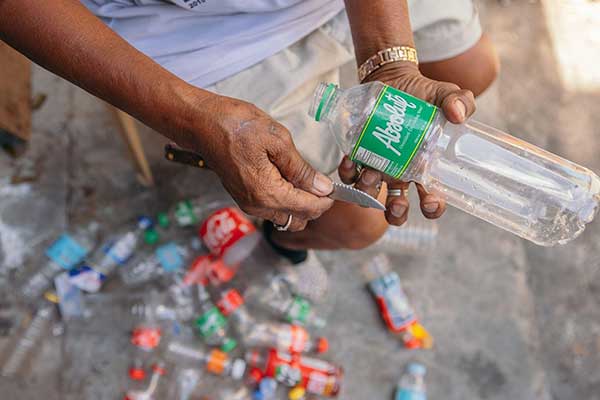
The impact of upcycling and recycling credits on PCX Markets, a platform funding plastic waste recovery, surged by 1,500% in 2023.
The increase highlights the growing commitment of large corporations to meet sustainability goals and comply with the Philippines’ Extended Producer Responsibility (EPR) Act.
The sale of these credits facilitated the upcycling or recycling of 9,000,000 kg of plastic waste last year.
The significant rise in demand for credits from recycling and upcycling projects underscores the effectiveness of the Philippines’ new EPR Act.
The law mandates that corporations with assets over PHP 100 million recover and divert a portion of their plastic packaging footprint.
The target starts at 20% by the end of 2023, increasing to 40% by the end of 2024, and by 10% each year until it reaches 80% by the end of 2028.
One notable project on PCX Markets’ platform is an upcycler in Bulacan. The project converts low-value plastics, such as those from beverage cartons and sachets, into construction and furniture boards.
Due to the rising demand for credits in 2023, the upcycler aims to triple its processing capacity by September 2024.
Another project in Davao recycles PET bottles into flakes for various products, including plastic containers and clothing fibers.
The increased demand for credits has provided financial stability, allowing the recycler to plan for expanded capacity in 2024.
They estimate this will enable them to process an additional 1 million kg of plastic waste into flakes every month, a 15% increase over last year.
Under the EPR Act, companies can adopt various strategies to meet their targets. These include reducing plastic use, using recyclable packaging, and implementing recovery and diversion programs.
Plastic credits, which fund the cleanup and responsible processing of equivalent plastic waste, are a key component. All compliance strategies must be verified by independent third-party auditors.
The Philippines is a significant contributor to global plastic pollution, consuming over 2,150,000 metric tons of plastic annually, with only 9% recycled.
A staggering 35% of this plastic ends up in the environment. The lack of comprehensive waste management and recycling infrastructure exacerbates the issue.
PCX Markets’ credits provide a crucial funding mechanism for expanding recycling infrastructure and supporting waste management efforts.
Many companies are now purchasing verified recycling and upcycling credits from PCX Markets to meet this year’s 40% EPR target.
Some are even taking proactive steps to offset 100% of their plastic footprint, accelerating investment in recycling infrastructure.
“The Philippines urgently needs a market-based mechanism to fund the cleanup of the plastic pollution that’s choking our country. We also need a financing mechanism to kickstart the growth of our recycling industry, which is really in its early days. PCX Markets hopes to do our part by supporting both,” said PCX Markets founder Nanette Medved-Po.
“We’re incredibly excited to see a sharp rise in demand for recycling and upcycling credits. Companies now have to take responsibility for 40% of their plastic footprint by the end of this year, and they really want to make it count in ways that have lasting impact. We just sold the entire annual capacity of one upcycler to a single company. I can’t wait to see what the second half of the year brings.”
PCX Markets anticipates continued demand growth, further supporting the expansion of recycling and upcycling capacities in 2024 and beyond.





















